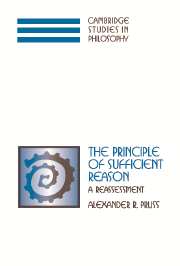Book contents
- Frontmatter
- Contents
- Acknowledgments
- Part I The Principle of Sufficient Reason and the Causal Principle
- Part II Objections to the PSR
- 4 A Modern Version of the Hume Objection
- 5 The Anti-theological Argument That There Are No Necessary Beings
- 6 Modal Fatalism
- 7 Free Will
- 8 Quantum Mechanics
- 9 Turning Leibniz against the PSR
- 10 What Survives the Criticisms of the PSR?
- Part III Justifications of the PSR
- Bibliography
- Index
8 - Quantum Mechanics
Published online by Cambridge University Press: 27 July 2009
- Frontmatter
- Contents
- Acknowledgments
- Part I The Principle of Sufficient Reason and the Causal Principle
- Part II Objections to the PSR
- 4 A Modern Version of the Hume Objection
- 5 The Anti-theological Argument That There Are No Necessary Beings
- 6 Modal Fatalism
- 7 Free Will
- 8 Quantum Mechanics
- 9 Turning Leibniz against the PSR
- 10 What Survives the Criticisms of the PSR?
- Part III Justifications of the PSR
- Bibliography
- Index
Summary
Since all experiments are subjected to the laws of quantum mechanics, the invalidity of the law of causality is definitively proved by quantum mechanics.
(Heisenberg, 1927, p. 197, trans. in Stern, 1969, p. 132)THE PROBLEM OF INDETERMINISM
If quantum mechanics is correct, on whatever interpretation, there are experimental setups such that no amount of observational knowledge of the initial system could possibly predict the outcome. An electron goes through a magnetic field in the Stern-Gerlach experiment in a superposed spin state |up> + |down>. It will take an upward or downward path through the magnetic field, and if quantum mechanics is correct, no observation of its physical configuration prior to the performance of this kind of experiment can possibly reveal which it will be.
The standard indeterministic interpretation of quantum mechanics has it that not only can no observation of the prior physical properties of the system, including of the electron, allow us to predict the outcome of the experiment, but that the system lacks any physical properties, observable or not, such that were they known ahead of time, we would know what the outcome is. In other words, on this interpretation, two quantum mechanical systems that start with exactly the same intrinsic properties can behave in different ways. This is indeterminism. It is seen as challenging the PSR for exactly the reason libertarian free will is, but more deeply because the defender of libertarian free will can allow for indeterministic explanations involving the reasons for one action rather than another.
- Type
- Chapter
- Information
- The Principle of Sufficient ReasonA Reassessment, pp. 160 - 170Publisher: Cambridge University PressPrint publication year: 2006

